Home » Past Events
Category Archives: Past Events
Session 4: Literature and Performance
Session 4:
Between words and performance
(Wioletta Grzegorzewska, Marek Kazmierski and Zuza Tehanu)
Come and meet unusual Polish neighbours: artists, writers and performers.
You will be able to talk to them, ask questions and take part in discussion.
During the session:
-reading of poems;
-reading of fragments of short story;
– a short performance;
Artists’ profiles:
- Wioletta Grzegorzewska
- Marek Kazmierski
- Zuza Tehanu
Session 2: Theatre – Performance
Session 2: Meet the Polish Artists: Theatre, Performance, Film
(Margot Przymierska and Dominika Akuszewska)
Drop in for an amazing session to see what is being created in London by young film and theatre creators…
Artist: Margot Przymierska
Project title: ‘Romanians’- exploration of the subject: ‘How stage-able is bi-linguality?’
Artist: Dominika Akuszewska
Project title: Play Poland Film Festival
Questions for discussion:
- What do you think/ feel when watching a theatre play/ film in a foreign language?
- Is theatre performed in the original language (non-English) relevant today in London? Why?
- Is Polish art any different than any other art?
- Will you look for more Polish art or you had enough?
- How would you describe Polish cinema?
Artists’ profiles:
- Margot Przymierska
- Dominika Akuszewska
Session 1: Film about Polish Artists
Session 1: Mally Yina in discussion with Urszula Chowaniec
(Saturday, May 11, 1-2 pm)
PolinArts i Prometeusze
Come to this session to see a film and take part in the lively discussion on Polish Artist and their search for identity….
Artist: Mally Yina
Project title: PolinArts i Prometeusze / PolinArts and Prometheus (Presentation of the Documentary on Polish Artists in London)
- Questions you may be asked before the film:
- Based on your life experience, how could you describe your national identity?
- What elements from your national identity do you consider most important?
- From your knowledge, what is a general opinion about Polish people?
- How many Polish people do you know personally?
- What are their jobs?
- Have you heard about Polish artists who work in London? Why/How?
- Do you know any Polish jokes?
- Discussion after the projection:
- Was there anything in the film that was new to you?
- Was there anything that especially surprised you?
- What are your reflections about the identity of migrants?
- What are your reflections about your own identity?
- Would you like to know more about any of the artists?
Artist’s Profile:
Mally Yina is a theatre director and an award winning filmmaker.
2014 UCL Festival of the Arts (29 May)
eMigrating Landscapes Project presents a series of event
Telling Mother Tongues.
I am Polish: Meet the Artists
Venue:
29th of May: UCL Roberts G08 Sir David Davies Lecture Theatre,
Roberts Building, Malet Place
Programme
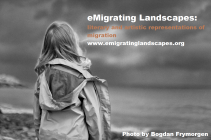
BY BOGDAN FRYMORGEN
The numbers of migrants and their economic impact are often measured and discussed in the media. But these figures miss the human element: the cultural, literary and artistic perspectives of emigration and migration. The eMigrating Landscapes Project, led by dr. Urszula Chowaniec, investigates how language underpins activity after displacement. What happens to art when its creator relocates? Meet the Poles making both art and homes in London.
These events are aimed at an English-speaking audience. (Polish and non-Polish speakers welcome.)
-
29th of May: I am Polish: Meet the Artists: drop in sessions: come along and take part in interesting discussions and presentations of various activities, initiatives and events that are taking place in Polish community in London and UK.
Including:
- Joanna Rajkowska on her Project with UCL SSEES and UCL Art Museum;
- Małgorzata Gryglicka Dawidek, a drop in session chaired by Urszula Chowaniec;
- Dominika Akuszewska, Agnieszka Szara & Play Poland Full Festival on contemporary migration in films;
- Queer Poland chaired by Richard Mole (discussion with the artist Katarzyna Perlak.
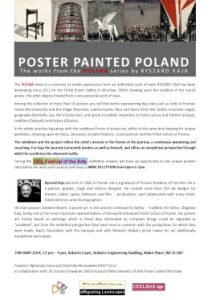
PLAYFULL
-
29th of May: Polish Posters Exhibition and film/presentation (English subtitles) on the theme of migration, organised by the Play Poland Film Festival.
See all Festival’s page
The series of events are financially supported by the Centre of East European Languages Based Areas Studies CEELBAS
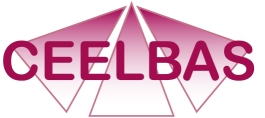
and Polish Cultural Institute in London
2013 UCL Festival of the Arts (11-12 May)
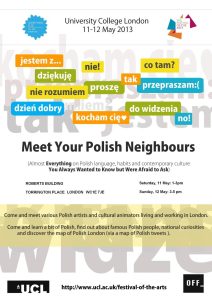
UCL Festival of the Arts, UCL SSEES, Off-Press AND LoVArts invite you for the drop-in sessions to on May 11th and 12th, when there will be 5 drop-in sessions with some snacks and drinks – No registration needed, just come and enjoy!:
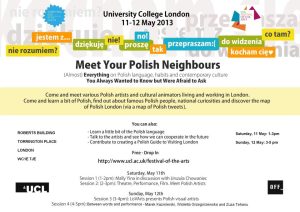
Polish has become the second most frequently spoken tongue on these Islands (The Guardian – “Polish becomes the England’s second language”), present all the time on the Tube, at bus stops cafes, restaurants, libraries and universities… but who are your Polish neighbours?
Come and meet some of the Polish artists and activists living in London: you will meet film makers, photographers, poets, writers, thinkers and teachers who came to London to start new lives and to make the capital a bit different.
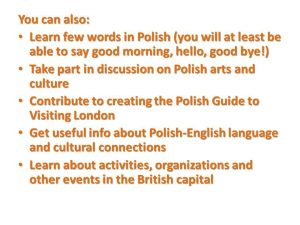
Come and learn a bit of Polish, find out about famous Polish people, national curiosities and discover the map of Polish London (via a map of Polish tweets in London).
6 November, 2014: Coming Out Polish Style
“Coming Out Polish Style”
by Sławomir Grünberg & Katka Reszke
Screening followed by discussion panel with prof. Anne White (UCL SSEES), dr Richard Mole (UCL SSEES), Katke Reszke and Katarzyna Perlak
Thursday, 6 Nov, 2014 at 6.30
ROOM 433, SSEES, UCL
16 Taviton St, London WC1H 0BW
PLAY OUT in collaboration with UCL SSEES, eMigrating Landscapes Project and Women Online Writing
“Coming Out Polish Style”
Poland, USA 2011, 61 mins
The documentary offers an exeptional look into the lives of gays and lesbians in contemporary Poland. It explores the issues of gay and lesbian rights in a conservative society, which undergoes a dynamic transformation, increasingly permitting successful liberal changes.
The film focuses on the diverse and complex identity struggles involved in the process of ‘coming out.’ It profiles both celebrities who are openly gay in Poland and young people from small towns who are still in the process of ‘coming out.’
More at BLOG
The event was made possible thanks to the support of SSEES Centre for the Studies of Central Europe and cooperation between Play Full with dr Rochard Mole and prof. Anne White.
All welcome
16 May, 2014: Poor but Sexy (discussing Eastern Europe)
Culture Clashes in Europe East and West
Meeting with Agata Pyzik,
author of the latest publication from Zero Books
In discussion with Wendy Bracewell, Federica Mazzara,
Ewa Sidorenko, Dana Dȍmșȍdi
(discussion led by Urszula Chowaniec)
Friday, 16 May 2014, 6-8 pm.
Senior Common Room, 4th floor
UCL School of Slavonic and East European Studies
16 Taviton Street, London WC1H 0BW
Registation
For further details please contact: u.chowaniec@ucl.ac.uk
What’s the East and the West? How do we perceive the East and its transformations? What’s behind post-1989 developments?
Excerpt from the book:
(from the introduction)
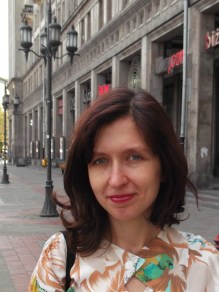
AGATA PYZIK
“This book should read like my coming to terms with being from the former East and what it means to me, as well as the discoveriesI made on my way. The typical view of the migrant is that every- thing is better in the new country. For me, a migrant not forced economically, equipped only with cultural capital, I looked at it from the beginning with mixed feelings. In fact, economically the contemporary West has never had so much in common with the East as it does now. Our economies may differ in scale, and though Polish propagandists like to imagine that in the near future they’ll overtake the UK, the British economy is still 70% bigger than the Polish – but in the current critical state they all function more similarly than before. This is the world of post-Fordism, a stream of cheap labor, flowing from one country to another, all equally fucked despite differences. It is perhaps this disgust with what the West did with all its opportunities, political chances, stock and philosophy that motivates this book.
Those years between 1945 and 1989 require a living and lived cultural history, where personal engagement and experience is not a curse, but a value. Many memoirs and accounts have been produced since the dissolution of the Soviet Bloc, and mine wants simply to ask the question – where are we now, after 23 years? If the Soviet Union 23 years into its existence wasn’t called post-tsarist, why are we still defined as “post-communist”, and why is it relevant? Did history take a slower pace, or was it finished, as Fukuyama said, after 1989?”
7 May, 2014: Ewa Lipska – an Encounter with the Author Ewa Lipska
Ewa Lipska
Sefer
Journeys Through Memory – the Healing Image
Wednesday 7 May 2014, 6-8 pm.
Senior Common Room, 4th floor
UCL School of Slavonic and East European Studies
16 Taviton Street, London WC1H 0BW
Registation
For further details please contact: u.chowaniec@ucl.ac.uk
“All of us, regardless of our historical situations, are hunting for our past….
We’ll always be talking it through with our psychotherapists, with historians
– today’s detectives.” Ewa Lipska
More about the author here
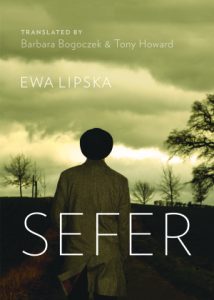
Programme:
- Introduction (Urszula Chowaniec)
- Reading: excerpts from Ewa Lipska’s novel Sefer (Ewa Lipska in Polish and Tony Howard in English)
- Discussion: Ewa Lipska, Francois Guesnet (UCL), Katarzyna Zechenter (UCL), Barbara Bogoczek , Tony Howard (Warwick University), Urszula Chowaniec (UCL/AFM KU)
- Q&A
- Reception and book signing
(with music based on motifs from Sefer)
Ewa Lipska, Sefer, English translation by Barbara Bogoczek and Tony Howard. Published in Canada by AU Press, Athabasca University Press, 2012
Free PDF available on the Publisher’s site here
Excerpts:
I had a remarkably original father. Father
owned the Sefer publishing house, which, although it
didn’t bring in any income, helped him cope with his
fear of depressive memories, and with claustrophobia.
Fortunately he also worked at an historical institute —
as a detective, because after all who but a detective can
write history. He left behind an unravellable will, with
which I’m still struggling today. I was an only child. In
my youth I dreamed of becoming a doctor, a solicitor,
a beggar, a musician, an actor, a demon, and a salesman.
But I went along with the wishes of my whole family,
read medicine, became a psychiatrist, and I practice
psychotherapy now. Thanks to which, I became linked
forever with the demons of our time.
***
The clerk stopped her work, looked at the postman and said:
“But that’s why my marriage collapsed. I predicted my
husband’s death.”
“What? Your husband’s alive, isn’t he?”
“Exactly. We were young, healthy, and in love, then one
night I dreamt I was in mourning. All that remained of
my husband in my dream was his absence. I woke up in fear
and trembling. He was still lying next to me. It seemed to
me he wasn’t breathing anymore. I tugged at his hand, and
I couldn’t believe it when he suddenly jumped up, asking
what had happened. Had something happened? Ludicrous
question, isn’t it? I began to cry a lot. I was weeping for
him. With every knock on the door, I expected a Notification
of Death. Meanwhile he kept on going out to work. And
coming back. I cooked him cranberry compote but behaved
like a widow. I started buying black dresses, blouses, jackets.
We began living a life after death. Something had to happen,
I knew. Because it was all predicted. One day my dead
husband, whom I so adored, applied for a divorce at the
district court . . . I don’t even know where he’s buried.”
She confirmed it by stamping another letter.
The postman asked, “Isn’t this work boring?”
“No. Why? There’s a different date stamp every day.”
***
On our way to the hotel Maria and I talked about
the double nature of language, which can suddenly flick
you from a smart sophisticate into a lout. Just a moment
ago language was entertaining us with the brilliance
of its wit and palette, only to announce suddenly in the
middle of the town square: “I’m kurwa trying to explain
it to him, and he just gobbles up his fucking sausages!”
Maria went back to rejoin her friends while I phoned
Doktor A. at the clinic. He read me part of a letter from
a patient whose history he’d tried to build into a case
study: “Dear Herr Doktor, why won’t I answer personal
questions? Because I never answer personal questions. Do
you remember what Goethe wrote about Werther? ‘Oh, how
often I’ve cursed those foolish pages that made my youthful
torments public property!’ We live in an age of collective
exhibitionism; we strip ourselves naked mercilessly, down
to the bare void. The void that traps us forever. And you,
Herr Doktor, think that I’ll tell you everything, undress down
to the last nerve. You all know too much about me anyway.
I bet when I’m wired up for my ECG, you’re recording the
love inside my heart. Nowadays everything belongs to
everybody and nobody.” Doktor A.: “So I arranged to
meet him outside the clinic. And in two hours he told
me much more than I would’ve got on the record.”
“And how’s your vegan blonde?” I asked. “Or is she
a kosher brunette now?” “Not yet, but you’d better
come back to Vienna soon. I don’t like diagnosing
over the phone.”
About the book:
Description
Lucy Popescu’s review
Justyna Sobolewska’s review
Also
Piotr Gwiazda’s review of Sefer in The Times Literary Supplement, Published: 22 February 2013;
Chris Miller’s review: The Warwick Review, Vol.VII NO.4 December 2013, p.14
7 February, 2014: Grzegorz Wroblewski
GRZEGORZ WROBLEWSKI AND FRIENDS:
AN EVENING OF POLISH MIGRATING POETRY
Poetry Reading and Discussion with Grzegorz Wróblewski and his translators, Piotr Gwiazda and Adam Zdrodowski
Introductiona and chairing: Steven J. Fowler and Marcus Slease
Venue:
4th floor Masaryk Senior Common Room
UCL School of Slavonic and East European Studies
16 Taviton Street, London WC1H 0BW
5-7 pm
Registration HERE
Kopenhaga is the first comprehensive collection of prose poetry by Grzegorz Wróblewski, one of Poland’s leading contemporary writers. The book offers a series of vignettes from the crossroads of politics and culture, technology and ethics, consumerism and spirituality. It combines two tropes: the emigrant’s double identity and the ethnographer’s search for patterns. While ostensibly focused on Denmark, it functions as an investigation of alterity in the post-cold war era of ethnic strife and global capitalism. Whether he writes about refugees in Copenhagen (one of Europe’s major transnational cities), or the homeless, or the mentally ill, or any other marginalized group, Wróblewski points to the moral contradictions of a world supposedly without borders.
Some quote here:
“Grim, glancingly beautiful, always necessary.”
—Joshua Clover
“Wróblewski is the true poetic chronicler of our 21st century diaspora in all its absurdities and anxieties … Kopenhaga is a journey to the end of the night that always makes a U-turn in the middle, to take in the latest folly—and also self-rescue mission—of the transplant. Read it and weep—and then laugh!”
—Marjorie Perloff
For more go here
Programme:
1. Piotr Gwiazda about translating of Kopenhaga
2. Grzegorz Wroblewski (in Polish) Piotr Gwiazda (in English) reading excerpts of Kopenhaga
3. Marcus Slease and Adam Zdrodowski presentation of poetry (in Polish translation and English)
4. General discussion/question and answers
Wine reception after the event
All are welcome
15 January, 2014: Where the Beast is Buried (Joanna Rajkowska)
In Search of Public Space
Joanna Rajkowska in conversation with Maggie Humm, Martine Rouleau and Katarzyna Depta Garapich
discussion chaired by Kinga Stanczuk
Seminar and Book Launch
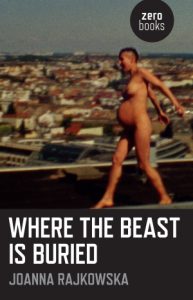
Venue:
4th floor Masaryk Senior Common Room
UCL School of Slavonic and East European Studies
16 Taviton Street, London WC1H 0BW
5-7 pm
Where the Beast is Buried, Joanna Rajkowska’s first English Language book, covering her artistic projects, gives the opportunity to talk about the role of art and public spaces in European contexts:
- Where is freely accessible public space?
- Is a public space in Eastern Europe different from that in UK?
- What can we do within it?
- How controlled is it and where are the limits of this control?
The following guests will take part In the discussion with Jonana Rajkowska
Maggie Humm (University of East London), Martine Rouleau (UCL)
and Katarzyna Depta-Garapich (Polish artist based in London).
Where the Beast is Buried
The first English-language book about Joanna Rajkowska and her unique practice of work in public spaces, within the contexts of diverse cultures and geographies.
Rajkowska’s unique artistic vision and methodology combines subjective narratives and critical discourses with a deeply felt concern for the spaces in which her works appear and the people they touch. Instead of simply invading or occupying public spaces, she blurs the identities and hidden tensions associated with them, navigating around communal dreams and fears. Historical trauma, cultural discourse, aesthetic relevance and geopolitical references all blend in her works in ways which both distress and heal, challenge and resolve, attack and absolve.
More information visit Zero Books website
Press release:
press_release_where_the_beast_is_buried
A food and wine reception will follow the discussion. All are welcome.
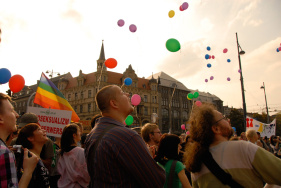
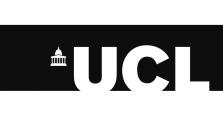
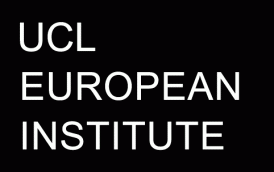
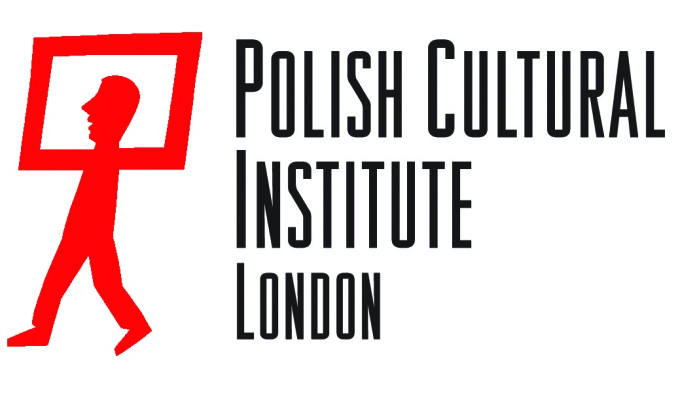
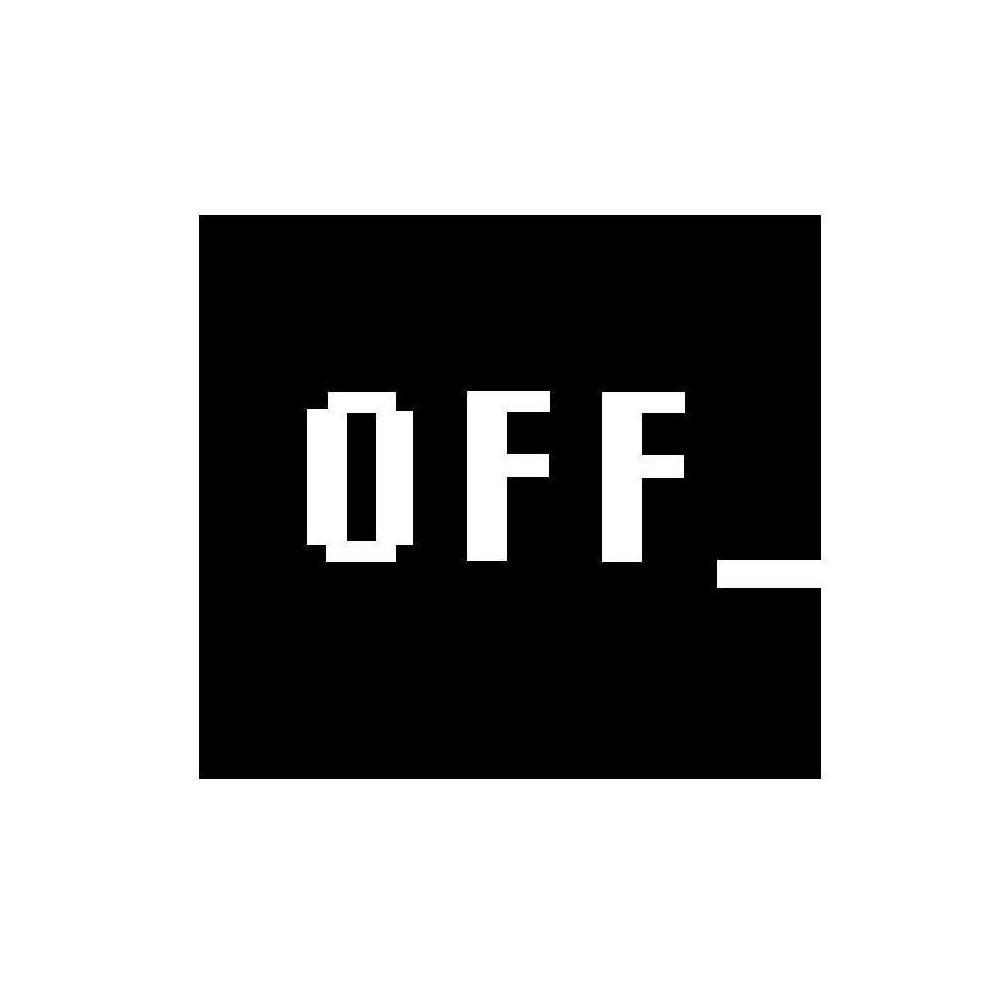
Recent Comments